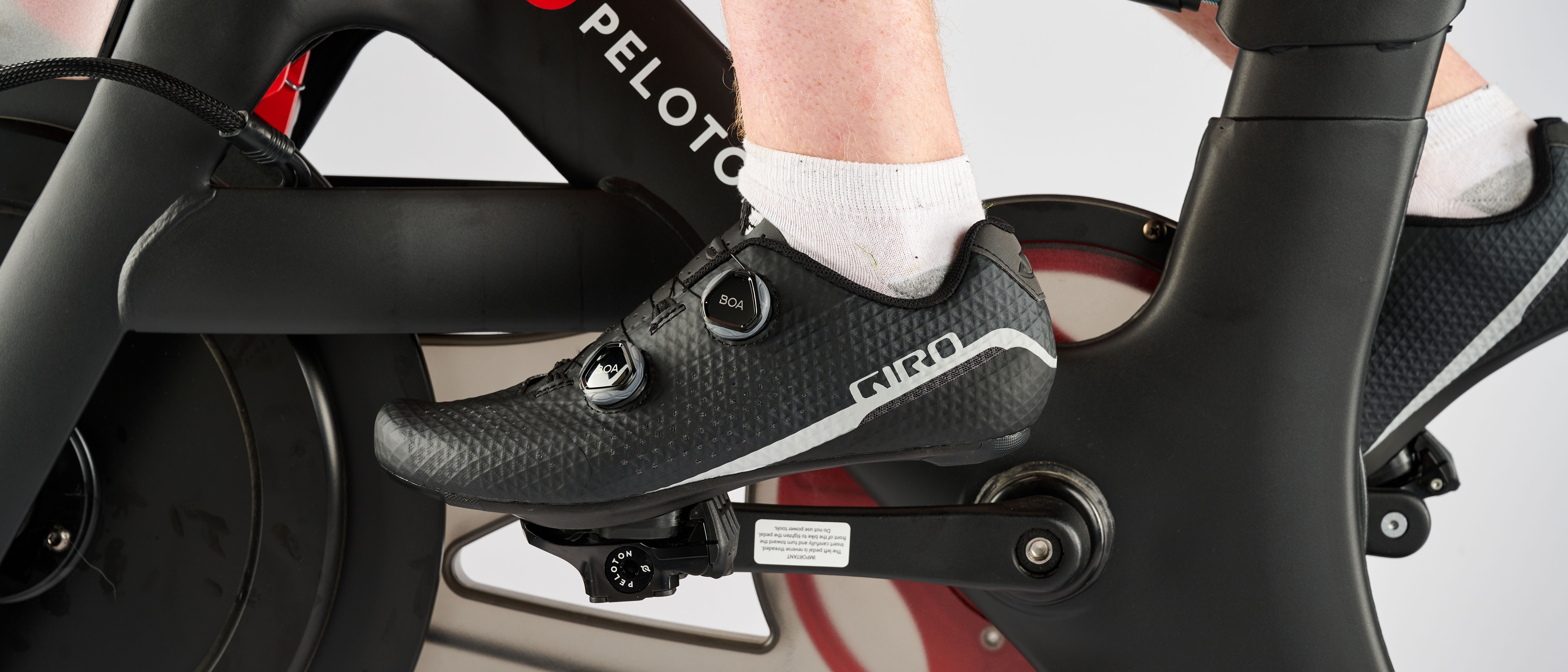Live Science Verdict
With their dual Boa L6 dials for adjusting the fit in milliseconds, a breathable-yet-seamless Synchwire upper, and laser-perforated ventilation to keep your cool, the Giro Regime Cycling Shoes are the real deal. We found they were comfortable out-the-box, too, allowing us to push the pace on our Peloton without suffering sore feet. After all, a severe spinning workout is painful enough on its own, right?
Pros
- +
Fit like a second skin
- +
Innovative Boa L6 dial-tightening system
- +
Comfortable, breathable upper
Cons
- -
You can’t loosen them without taking all tension off the lacing the cable
Why you can trust Live Science
Cycling shoes aren’t known for their cocoon-like comfort, nor are they renowned for their looks, so we were over the moon to find the Giro Regime Cycling Shoes offered style and substance (without sacrificing performance).
Slipping into the shoe feels like wearing a second sock, with the sleek Synchwire upper seemingly molding to the shape of our feet instantaneously. We also loved being able to fasten them around our ankles and forefoot in less than a second by twisting the dual Boa L6 dials to our desired tightness – with many of the other best shoes for Peloton relying on a single dial or less-precise velcro.
Size range: 6.5 - 14
Available colors: Black, white, carbon/copper and harbor blue anodized
Clip compatibility: Look Delta, SPD-SL
Clipping them into our Peloton Bike (you’ll need to buy and attach three-bolt cleats for this) we found the brand came good on its promise of a carbon-composite sole plate that delivered efficient power transfer, providing a responsive feel as we began to pedal. And subtle laser perforation throughout the midfoot and forefoot stopped our feet from overheating during seriously sweaty spin sessions.
We tested a pair in the all-black colorway, which – with their sleek profile – looked as much like a Stealth Bomber as they did a cycling shoe, something we appreciated when compared to the clunky look of many competitors.
All these premium features earned the Giro Regime Cycling Shoes a top spot on our tried and tested round-up of the best shoes for Peloton. So, for anyone wanting a quality cycling shoe that looks good and performs even better, we can’t recommend these highly enough.
Price and availability
The Giro Regime Cycling Shoes have an MSRP of $240 in the US and £229.99 in the UK. This makes them the most expensive option in our round-up of the best shoes for Peloton, but this is a case of “you get what you pay for”, as they are, after all, one of our top-scoring spinning shoes. They can be bought from the Giro website or are available from a range of stockists, many of which offer them at a discounted rate.
Design and features
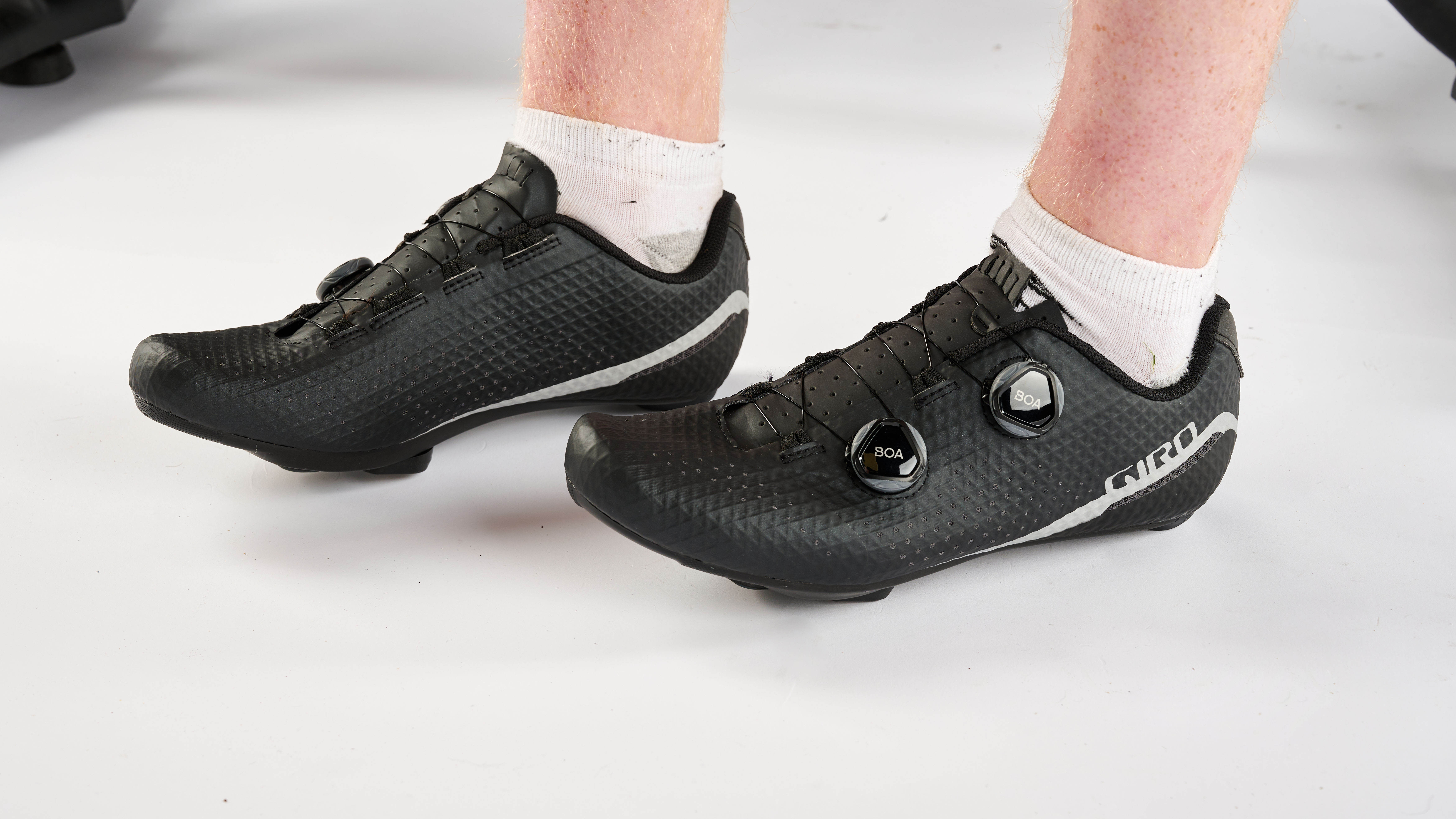
- Design and features score: 4.5/5
The minimalist design of the Giro Regime Cycling Shoes was a big hit with our testers. The simple colorways are a classy touch, and the use of the Boa L6 dials rather than velcro gives them a slimline aesthetic that looked like it was built for speed.
Get the world’s most fascinating discoveries delivered straight to your inbox.
The Boa L6 dials work by fastening a thin cable – where the laces would be in a standard shoe. Twist them clockwise and you can increase lace tension in 1mm increments, each indicated by a click of the dial, allowing you to find the right fit with precision. This also makes them a breeze to put on and take off, as you can release all tension in the laces by gently pulling the dial away from the shoe until you hear a soft popping sound.
Unfortunately, the L6 system can only tighten the fit, so you’ll have to release all tension if you want to loosen them before tightening to your desired fit again. But this is a small black mark on an otherwise efficient and effective lacing system.
The upper has a one-piece Synchwire design with a thermo-bonded exo-structure. While that may sound like a mouthful to first-time cycling shoe buyers, the result is a supportive and accommodating fit around the midfoot, and a lightweight (a US size 11 is just over 9.3oz) shoe that won’t weigh you down on longer rides.
Laser-perforated ventilation around the front and sides of the shoes allowed our feet to breathe when Peloton instructors had us hot under the collar during intense sessions, and the carbon-composite footplate felt responsive as we pushed the pedal to the metal.
Comfort
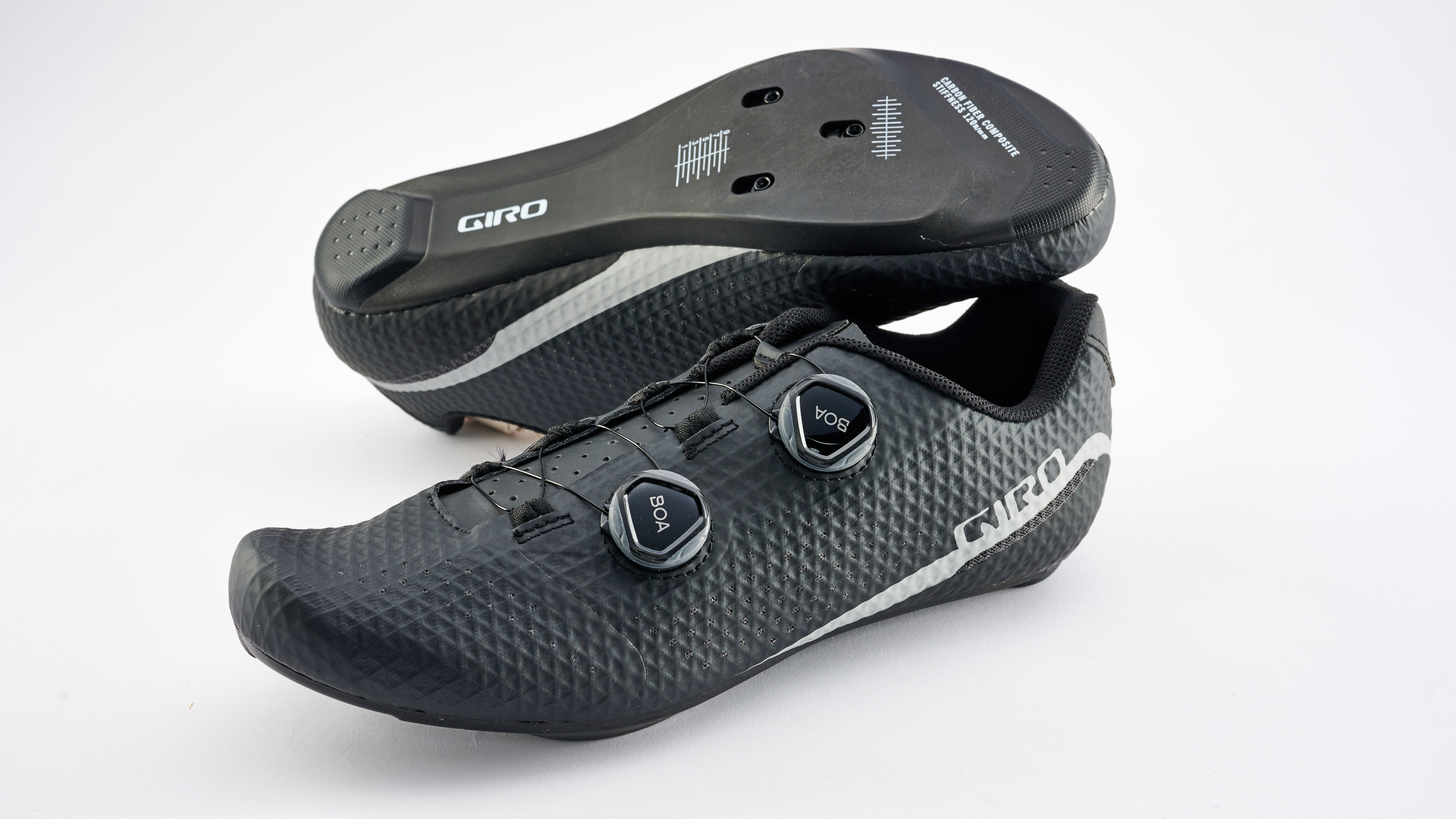
- Comfort score: 5/5
Making a comfortable cycling shoe is a fine art. You’ve got to find a functional balance between being flexible enough to mold to the foot and firm enough to hold it in place. Yet, like a consummate tightrope walker, the Giro Regime Cycling Shoes confidently tread the line between the two.
The upper has enough support to hold your foot in place as you keep pace with instructors, but we found it was still malleable enough that our feet never felt constricted or were made to ache. We loved the ability to tinker with the tightness in 1mm increments in the upper and lower foot – thanks to the dual Boa L6 fit system. This allowed us to fine-tune our fit so the shoes wrapped around our heel and midfoot like a second skin.
The carbon-composite sole provides the stiffness needed to ensure a good power transition from foot to pedal, in the downward and upward phases of the movement.
So, with this potent combination of comfort and performance at your fingertips (or should we say toes?), all you have to do is clip in and prepare to leap up the Peloton leaderboard.
Performance
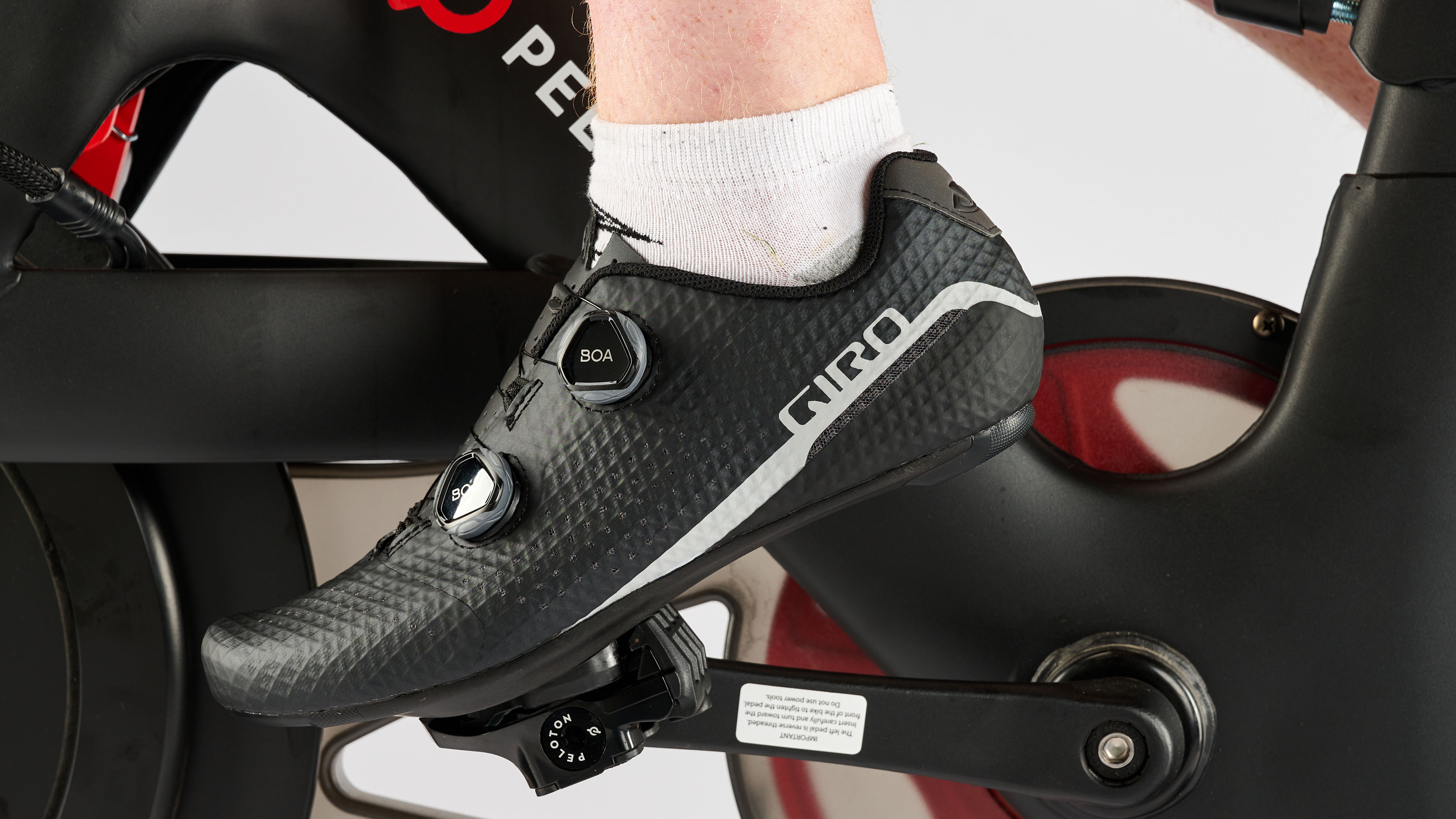
- Performance score: 4.5/5
It’s about time we slipped these shoes on our feet and gave you first-hand feedback. And luckily, after a series of long and short cycles, intense sessions and active-recovery rides, we’re happy to report they didn’t let us down.
The one-piece Synchwire upper fitted like a second skin, and felt like it, too, thanks to the lightweight nature of the shoes. Unlike many cycling shoes we tested, they also offered a true-to-size fit, so there’s no need to buy a size up as we found with the Nike SuperReps and Shimano RC1s.
We also loved the dual Boa L6 fit system, which enabled us to quickly tighten the shoes around our (often problematically narrow) feet so our heel and midfoot were locked securely into position. However, there was no undue pressure around the forefoot and our toes had enough wiggle room, so we stayed comfortable throughout all rides.
The inability to loosen the fit without using the Boa dial’s pop-release feature – which releases all tension in the black wire “laces” – is a drawback of the design, especially if you want to adjust them quickly while on the machine. Yet, they don’t take long to tighten again, particularly compared with the likes of velcro and lace systems, and the fact you can adjust them in 1mm increments is fantastic for finding your perfect fit.
This personalization continues in the carbon fiber composite footplate. There is 5mm of fore and aft cleat adjustment, meaning you can attach the cleats further forward or backward depending on your preference. And, once we had fitted our cleats and started cycling, we found the firmness of the sole provided a fantastic platform for transferring power from our feet to the pedals.
We were also appreciative of the perforated holes that run across the toe and up either side of the shoes, offering much-needed ventilation during intense interval sessions on the bike and keeping our feet from overheating.
Value for money
- Value for money score: 3.5/5
Their price (an MSRP of $240/£229.99) may be high but the Giro Regime Cycling Shoes justify this with their elite performance. If you’re just looking to get moving with a few Peloton sessions each week, the extra expense of a top-tier pair of cycling shoes may not be worth it. But, if you use the machine more frequently and have a wider interest in cycling (these cleats can be used with most road bikes) then investing in your comfort, and performance, could be worth your while.
Verdict
We struggled to muster a bad word to say about the Giro Regime Cycling Shoes. The innovative Boa L6 dial system makes getting them on and off a cinch, while their sock-like fit and slim profile means they look good and feel comfortable. The price may put some people off, but serious cyclists and Peloton regulars will love these shoes.
Alternatives
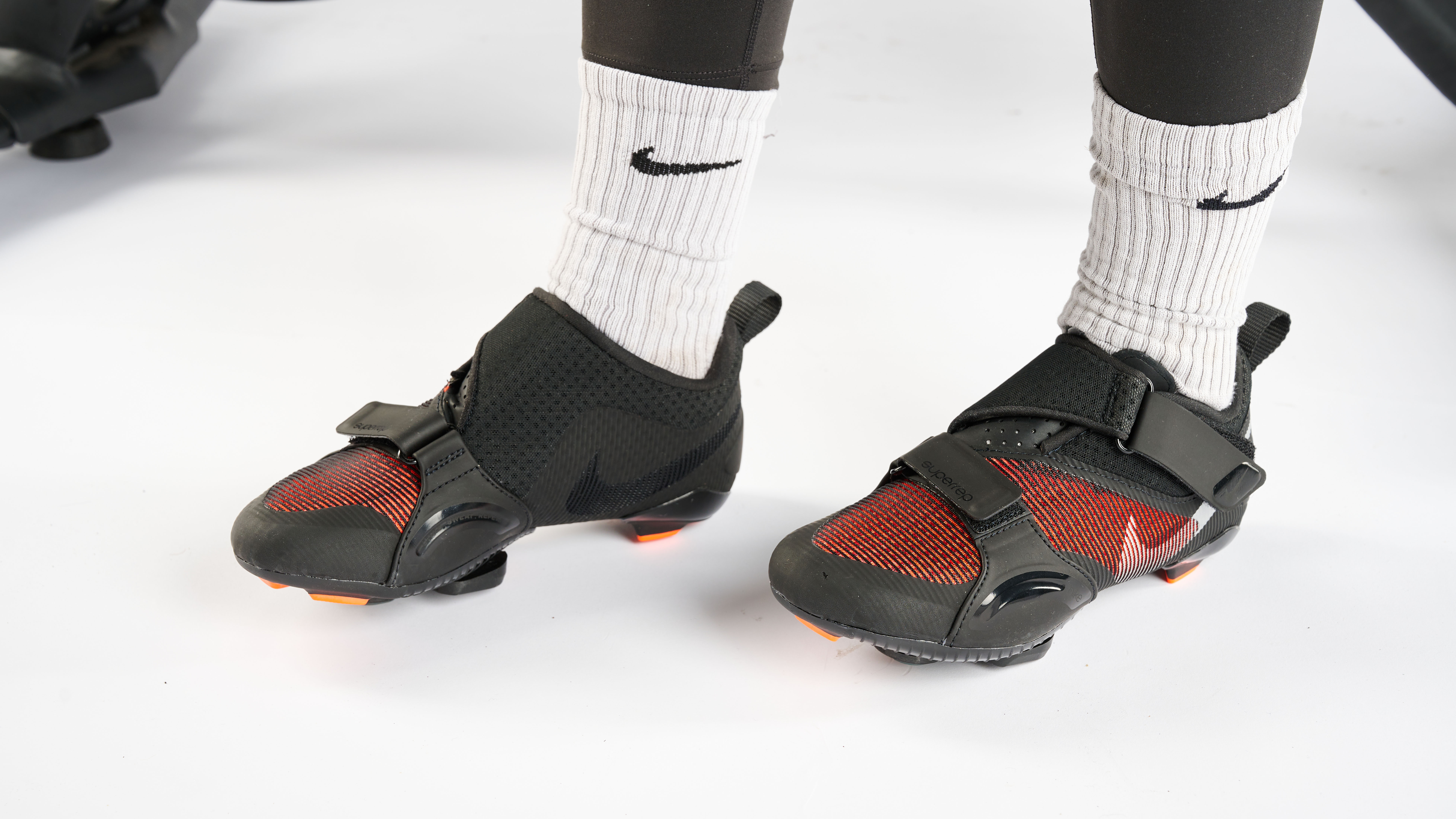
If you’re after a stylish pair of shoes to use while riding your Peloton Bike, but don’t fancy shelling out hundreds of pounds, the Nike SuperRep Cycles (above) are a good-looking alternative available for a fraction of the Giro’s price.
Or, if it’s top-tier performance at a more affordable cost that you’re after, the Shimano RC1 is a neat-and-tidy cycling shoe that you can pick up for less than £100.
How we tested the Giro cycling shoes
We tested the Giro cycling shoes in our purpose-built testing center and scored them from 1-5 across the following criteria:
- Design and features
- Comfort
- Performance
- Value for money
For all models, we tackled a fast-paced HIIT class and an active recovery session to ensure each shoe could power through and deliver – regardless of the user’s workout preferences.
We then gave the shoes an overall rating out of five with a final verdict summarizing each model's strengths and weaknesses, and whether we reckon they’re ride-ready.
User reviews
The shoes have netted 4.4 out of five stars on Amazon, with happy customers praising the look and fit of the shoes. Interestingly, a lot of customers with wide feet report that the shoes feel very comfortable and not too snug.
One person has negatively rated the shoe for being on the small size – but they're definitely in the minority here, with most people being satisfied with the fit.

Harry Bullmore is a fitness writer covering everything from reviews to features for LiveScience, T3, TechRadar, Fit&Well and more. So, whether you’re looking for a new fitness tracker or wondering how to shave seconds off your 5K PB, chances are he’s written something to help you improve your training.
When not writing, he’s most likely to be found experimenting with a wide variety of training methods in his home gym or trying to exhaust his ever-energetic puppy.
Prior to joining Future, Harry wrote health and fitness product reviews for publications including Men’s Health, Women’s Health and Runner’s World. Before this, he spent three years as a news reporter with work in more than 70 national and regional newspapers.





